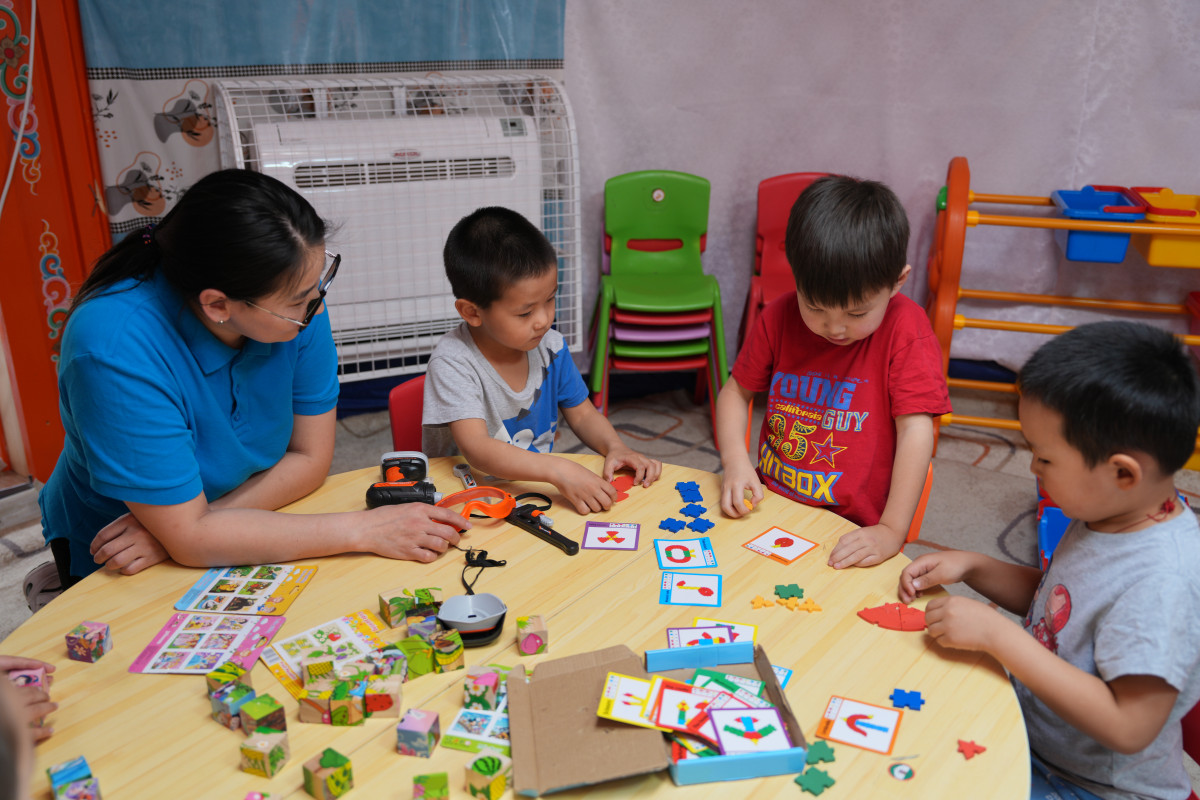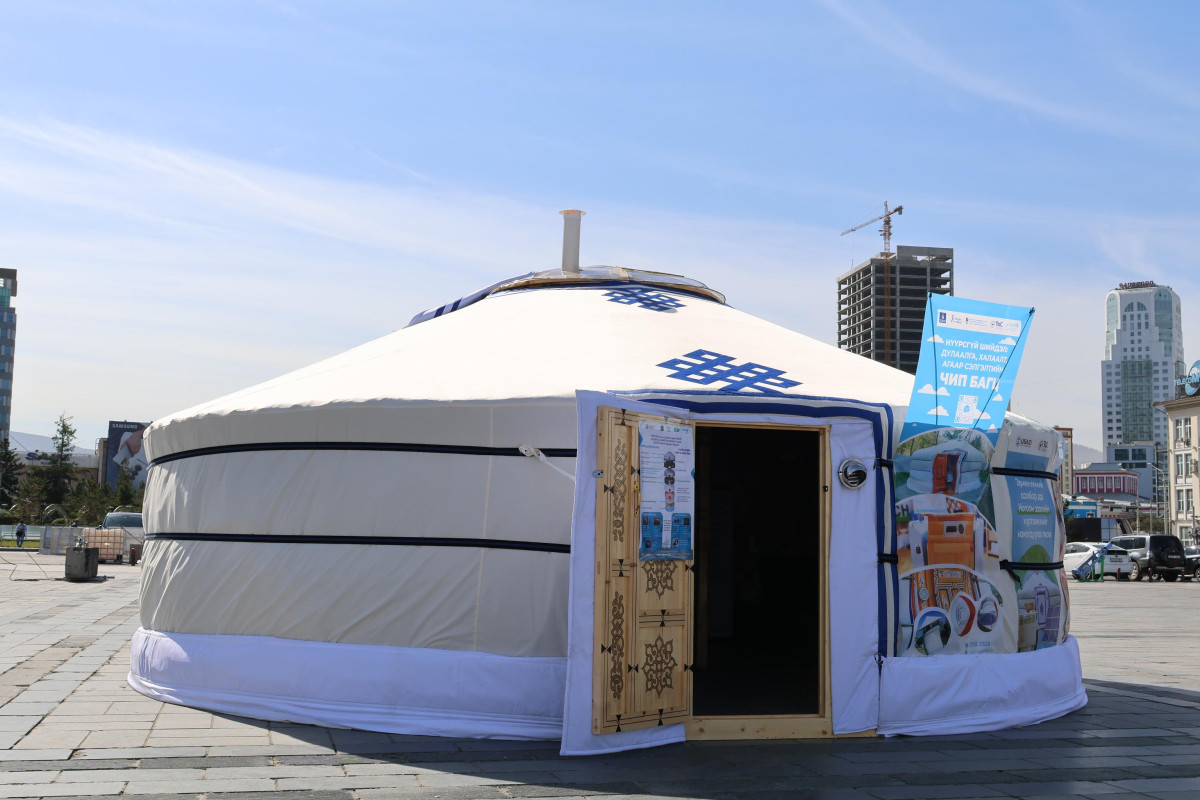Our role in addressing climate change is to enhance the resilience of the people vulnerable to a changing climate and environmental degradation, trying to maximise solutions in line with green growth and circular economy principles and solutions to reduce greenhouse gas (GHG) emissions and sequester/stock carbon.
In Mongolia, GHG emissions per capita are some of the highest in Asia and nearly two times the global average. The country is disproportionately affected by climate change, with children, the elderly, and low-income families bearing the brunt of its negative impacts.
We prioritize highly-contextual adaptation programming, particularly concerning environmental pollution that poses severe, long-term health risks to the people of Mongolia and can increase people’s vulnerability, also considering a changing climate. We are also one of the leading organizations for the independent monitoring and reporting of air pollution in Mongolia.
Ongoing ActivitiesORPast Activities

CLIMATE-RESILIENT GER (YURT) KINDERGARTENS
Click here to download the two-pager of the project
The air quality in Ulaanbaatar, Mongolia, especially in Ger districts, is critically poor, with PM2.5 levels often exceeding WHO recommendations. The traditional coal-burning heating methods contribute significantly to this pollution, affecting the health and development of children. This project aims to introduce climate-resilient, low-carbon heating solutions in kindergartens, benefiting approximately 200 children directly and over a thousand community members indirectly.
Climate-resilient ger (Yurt) kindergartens
Climate-resilient ger (Yurt) kindergartens project overview

Switching on the Green Economy Project
Click here to download the two-pager of the SOGE project
The European Union, through its SWITCH-Asia program, has funded a four-year project called “Switching on the Green Economy” (SOGE) with USD 2.2 million. The project aims to support Mongolian MSMEs and retailers in the agri-food and beverage sector to confidently adopt circular economy practices. This will be achieved through a market-based green certification and eco-labeling system, capacity building, behavior change, and access to green finance.Mongolia has set a national strategy to reduce greenhouse gas emissions by 22.7% by 2030. The Agri-Food and Beverage Sector is a significant contributor to environmental impact. Therefore, the country is embracing resource-efficient practices from the European Commission’s Farm to Fork Strategy to aid Mongolia's transition to a low-carbon circular economy and accelerate poverty reduction.
The project will establish a dedicated unit for eco-label green certification aimed at promoting environmentally friendly, resource-efficient, and smart practices among MSMEs and retailers through an electronic platform. Furthermore, a localized payment system will be created to incentivize consumers to choose goods and services from the retailers.
IMPLEMENTING PARTNER ORGANIZATIONS: People in Need INGO, Mongolian Sustainable Finance Association (MSFA), Development Solutions NGO, Caritas Czech Republic INGO

CHIP - Cooking, Heating, Insulation Package Project
Click here to download the two-pager of the CHIP project
Air pollution & CHIP innovation: Due to the high exposure to polluted air and climate related hazards, children across Mongolia are facing enormous risks to their overall health, cognitive development, access to nutritious food, and safe water. Without swift action, generations of Mongolians will live with the health and economic consequences of air pollution.To address these challenges, the CHIP package was designed and piloted with energy efficient and environmentally friendly “Cooking, Heating and Insulation Products” (CHIP) for ger households. To date, the project has benefited 4000 households in Bayankhongor, Govi-Altai, Umnugovi provinces and the 5th, 17th khoroos of Bayanzurkh district, Ulaanbaatar city from 2019 bringing health, thermal comfort and better Indoor Air Quality to children.
The CHIP package replaces the coal stove and chimney with an energy-efficient electric heater and circular air filters on the door and extra layers of windproof and waterproof insulation around and under the ger. All this was designed to improve energy efficiency and indoor air quality in traditional gers as well as reduce outdoor and indoor air pollution.

Haze Gazer
“THE HAZE GAZER” PROJECT
The fight against air pollution across Asia, including Mongolia, is one of the most pressing challenges in a generation. The impacts air pollution has on our daily lives extends to more than just health -- they are social, economic, and gendered. The initiative that was introduced by the UNDP and UNICEF Mongolia on International Human Rights Day, the Haze-Gazer platform is dedicated to monitoring collective impacts of air pollution on human health and safety, the socio-economic situation in communities, and to understand the public perception and reception of interventions to improve air quality.
The "HAZE GAZER" platform aims to:
● Collect and consolidate air pollution data in Ulaanbaatar city through DIGITAL smart devices based on active citizen participation;
● Provide valuable data to researchers, journalists and policymakers;
● Encourage citizens to take action to reduce air pollution impacts, as part of their civic duty, by sharing their life experiences and stories on the platform;
● Inform decision-makers on the multidimensional impacts of air pollution on citizens, in particular women and children as well as integrate data with secondary sources.
The platform is being developed by People in Need INGO and it is a public project, crowdsourcing the knowledge and data from the public. Therefore, the platform can only succeed with strong civic engagement to generate the data but also to learn together and build solutions for a better, cleaner, healthier future. ACTION FOR CLEAN AIR IS A SHARED RESPONSIBILITY!
About UNDP
UNDP is the leading United Nations organization fighting to end the injustice of poverty, inequality, and climate change. Working with our broad network of experts and partners in 170 countries, we help nations to build integrated, lasting solutions for people and the planet. For more information about UNDP Mongolia and its work on governance, SDGs and environment, visit: www.undp.mn
About UNICEF
UNICEF promotes the rights and wellbeing of every child, in everything we do. Together with our partners, we work in 190 countries and territories to translate that commitment into practical action, focusing special effort on reaching the most vulnerable and excluded children, to the benefit of all children, everywhere. For more information about UNICEF Mongolia and its work for children, visit: www.unicef.mn
About PIN
About People in Need (PIN): INGO based in the Czech Republic, launched programming in Mongolia in 2009, when it provided emergency assistance to herders affected by severe winter conditions (dzud). With the goals of saving lives and protecting dignity, empowering people and supporting sustainable living, PIN established its permanent presence in Mongolia in 2011. For more information about PIN visit: http://www.peopleinneed.cz/ , and its work in Mongolia, visit FB page: @PINinMongolia
For more information about the project or media inquiries, please contact info.mongolia@peopleinneed.cz.

Sustainable Technology and Business Development - Installing Chimneys in Ulaanbaatar´s Ger District
In ger district, the houses are often constructed with very simple plans and low quality, windows and doors that cause heat loss during Mongolia´s winters where the temperature can get down to -35 degrees Celsius. This has both negatively affected the health of Ulaanbaatar´s residents and contributed to climate change as the population living in these areas relies on burning coal for heat.
The project adresses these issues by installing chimney pots in gers and stand-alone houses (baishins) in Ulaanbaatar´s ger district to increase energy efficiency.
The primary impact of the chimney pot will be to save fuel , reducing the amount of exhaust emission to the air. The secondary saving of harmful emissions is due to better combustion of fuel. The promotion of chimney pots will increase awarness of the product and strenthen business ties to support sustainable production of the chimneys in Mongolia.

Switch Off Air Pollution (SOAP)

Right to Breathe

LTT4R
1) increasing the availability of early warning through an SMS platform,
2) assisting local and national authorities in disaster management,
3) research and advocacy around herder’s household vulnerability, the barriers they face for new and old coping mechanisms and advancing early warning systems and
4) developing disaster management plans, proactive pasture management plans and a dzud vulnerability index for use the Government of Mongolia and humanitarian actors in-country.
A key activity is the development in our target areas of local disaster management plans that include pasture management, and a vulnerability index for Mongolian herder population. Accessing weather information and an increased knowledge of the new challenges facing them will increase the resilience of Mongolian herders to shocks and stressors. At an institutional level, increased planning and sensitization will enable local and national authorities to better to respond to hazards in Mongolia. Working at these levels and advancing research on the challenges facing Mongolian herders, PIN Mongolia aims to increase the viability of the herding livelihood, a tradition in Mongolia, in the face of a changing climate.

Turning Sheep Wool into Environmentally Friendly Building Material (SWBI)
Sheep wool is an important resource in Mongolia. 90 % of it is raw wool which is in low demand and generates almost no profit for suppliers. For this reason, People in Need focused on this unused potential in a project for processing sheep’s wool as heat insulation construction material. Special emphasis is laid on the development of a supply chain involving small and medium enterprises, individual sheep farmers, and institutional consumers in the form of schools and state authorities. The programme, therefore, represents not only an interesting business opportunity for the inhabitants of Mongolia but also an environmentally friendly energy-saving alternative.

Supporting plant production in the Gobi
A promising alternative in the local conditions is plant production. The advantage in this lies not only in further potential income for individuals, but also potential for long-term development of the area. People in Need offered agricultural advice during which the emphasis was placed on economical management of scarce irrigation water and orientation in plant species with market potential. In this, PIN followed up on previously implemented programmes and built the Agrocentre advice centre which also serves as a model farm for plant cultivation, irrigation and storage.
The Agrocentre is also a distribution centre for quality seeds and seedlings and provides expert knowledge to existing and potential farmers not only about cultivating plants, but also about the subsequent phases of the business. In addition to this, it helps farmers form cooperatives and provides them with all the necessary agricultural data involved.
